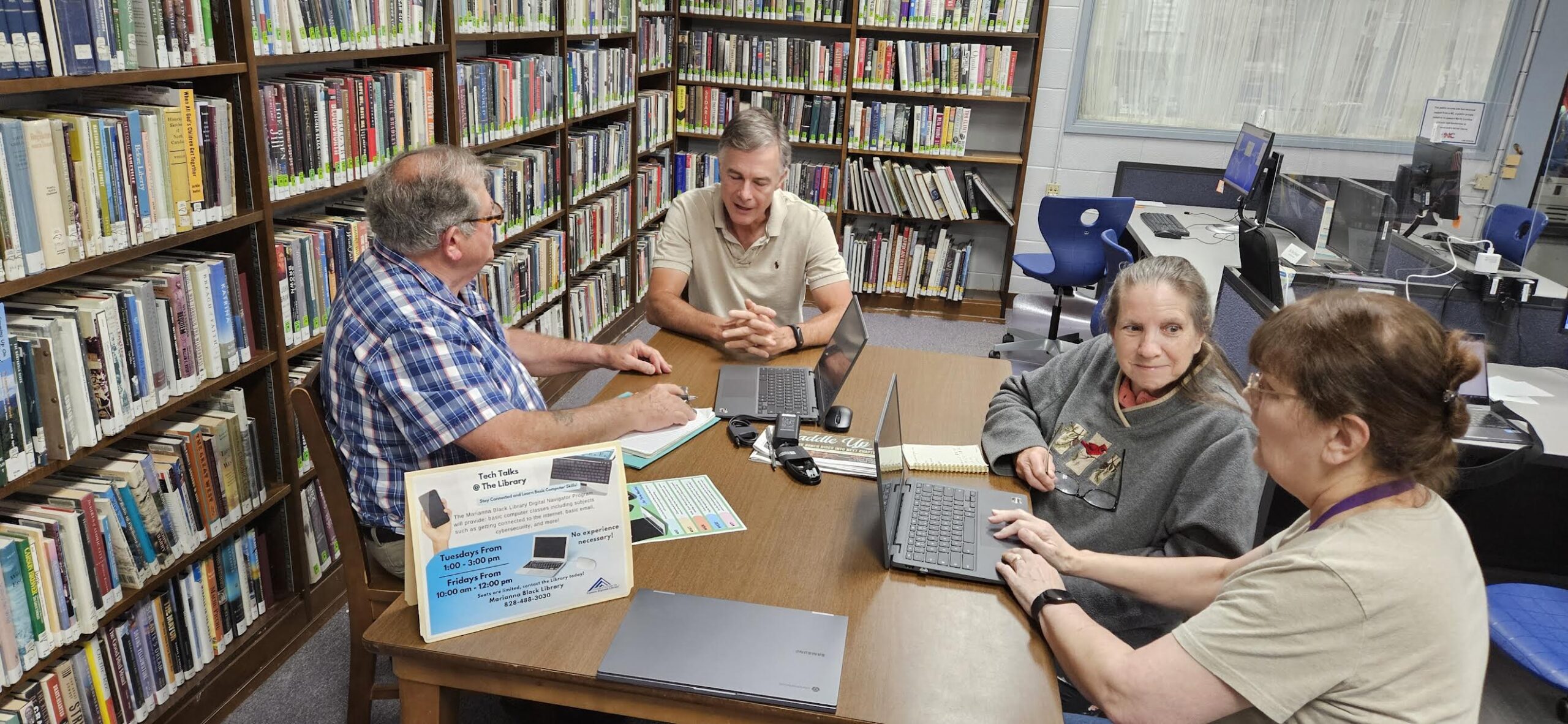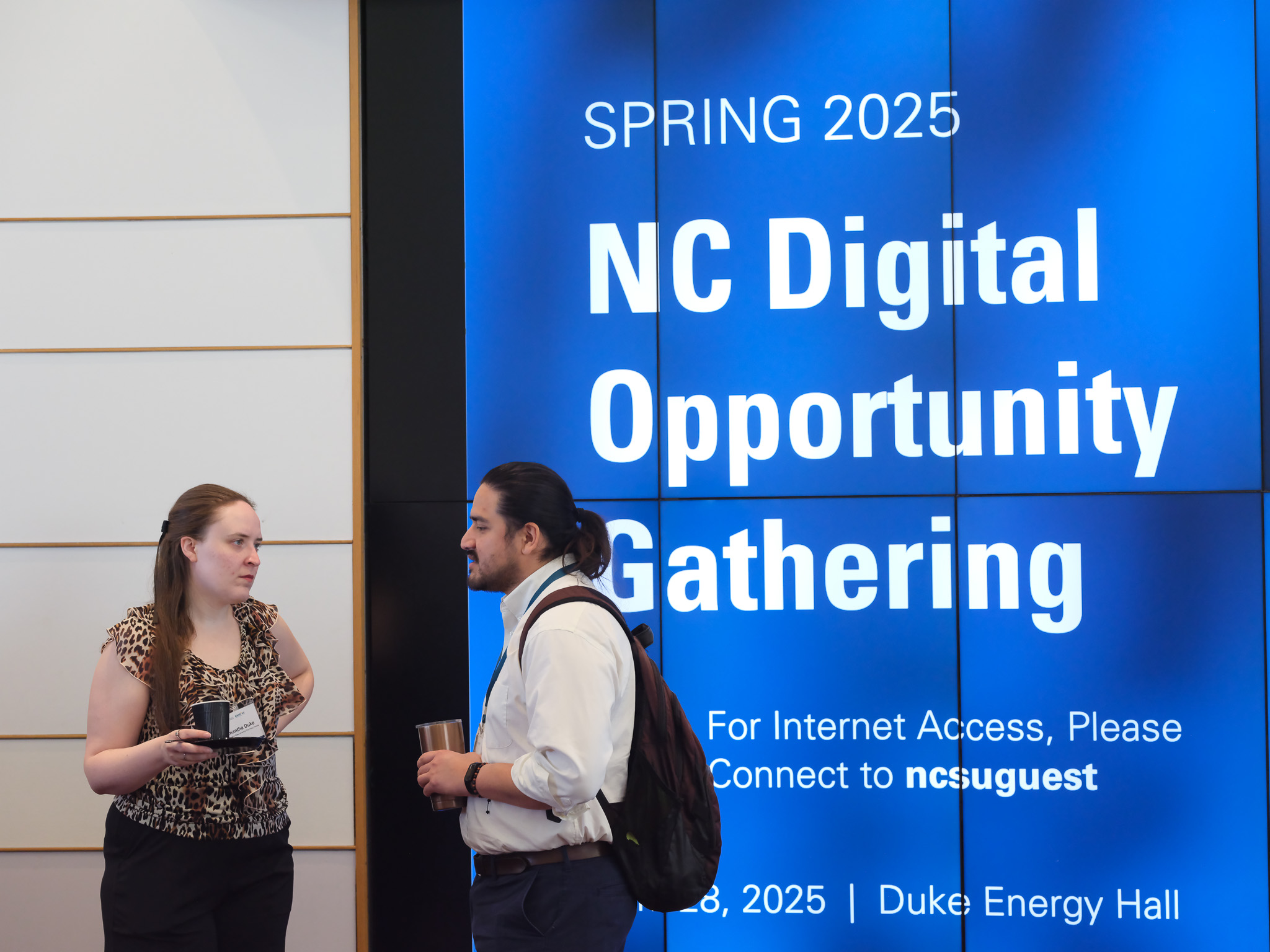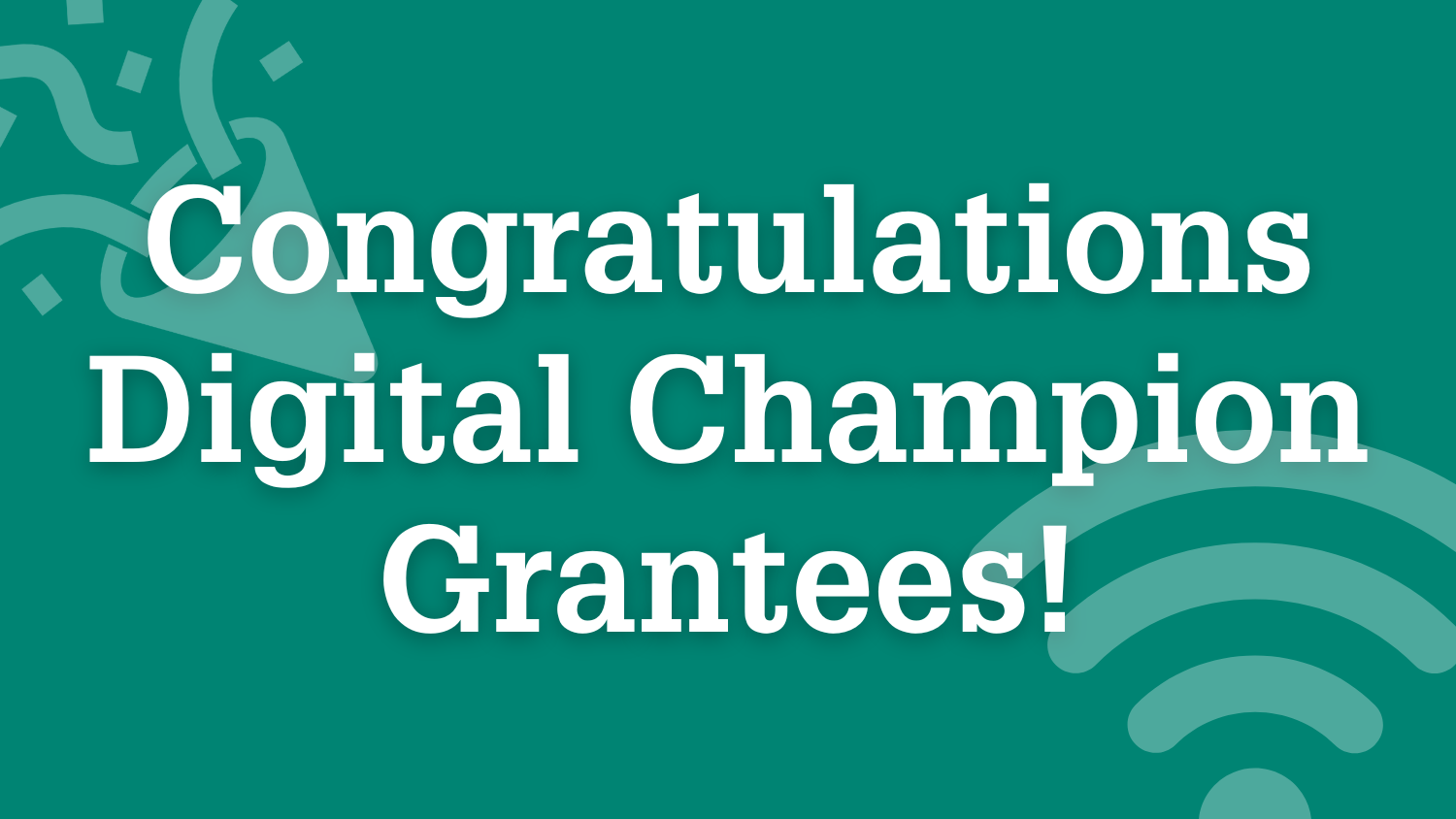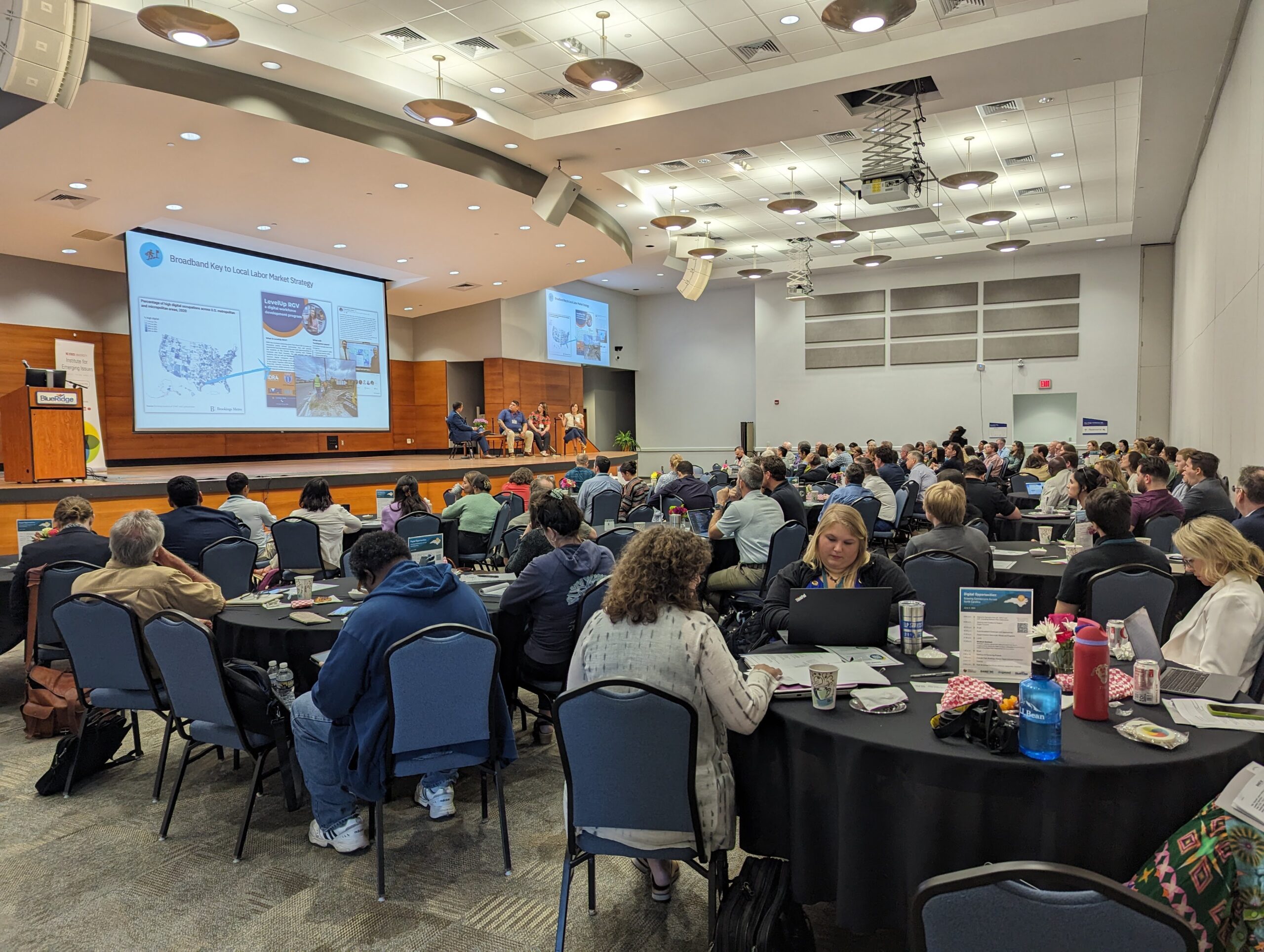The Institute for Emerging Issues is thrilled to celebrate and uplift our digital inclusion partners in Western North Carolina. Over the past four years, the five Western Councils of Governments (COGs) – covering 24 counties and the Qualla Boundary – have worked with local partners to create thoughtful, innovative digital inclusion plans and projects for their regions. This work was made possible through a generous grant from Dogwood Health Trust whose mission captures the strong links between broadband access, digital inclusion, and individuals living fulfilling and healthy lives. This work was supplemented by additional support from the State Employees Credit Union Foundation and the John M. Belk Endowment.
Below are links to the completed digital inclusion plans and updates from the Western NC COGs about their on-the-ground partnerships, digital inclusion implementation projects and future steps. These examples highlight the incredible efforts and strategies in the region and can be used as inspiration and roadmaps for others across the state. Digital inclusion planning is an integral initial step to building a strong digital equity ecosystem and we are excited for all the impactful initiatives and coalitions moving forward.
Foothills Commission Digital Inclusion Plans
- Cleveland County Digital Inclusion Plan
- McDowell County Digital Inclusion Plan
- Polk & Rutherford Digital Inclusion Plan
Please join us in congratulating the Foothills Commission staff! This team effort collected community input, contacted partners, and formed plans for McDowell, Polk and Rutherford intertwined the importance of infrastructure and adoption challenges and solutions throughout.
Check out the following updates from Foothills Regional Commission Director Community Economic Development, Alan Toney:
Important Partners on the Ground:
- Connect McDowell – Since 2019, this volunteer-led effort has blossomed from a decades-worth of work focusing on increasing broadband access and adoption in McDowell County. The coalition provides digital literacy classes and advocates at different county and regional levels for disconnected families.

Next Steps Include:
Working with Connect Humanity and Breaking Point Solutions to map and estimate the cost for potential BEAD projects.
High Country Council of Governments Digital Inclusion Plan
Coordinating digital inclusion connections was a massive undertaking in High Country with the number of potential partners. One-on-one conversations, tracking down digital inclusion champions, and structuring meaningful implementation goals led to a holistic, data-driven, and inspiring collection of county profiles.
Check out the following updates from Regional Planner & GIS Analyst, Tatiana Magee:
Important Partners on the Ground:
- A.M.Y. Regional Library System (Avery, Mitchell, and Yancey counties)
- A.M.Y. Regional Library system recently hired their first ever Digital Literacy Librarian using Dogwood Health Trust funding via the High Country Council of Governments Digital Inclusion Planning process
- Wilkes Recovery Revolutions
- Wilkes Recovery Revolution recently won the National Recovery Organization of the Year!
- Received NCSECU funding via the High Country Council of Governments Digital Inclusion Planning process to purchase devices to provide a free open-access computer lab with quality technical support available on-site
Exciting Projects in Progress:
- Northwestern Regional Library recently updated its Digital Access Tab (which was launched last summer with NCSECU implementation funds from the HCCOG Digital Inclusion Planning process) to reflect the ACP wind down and alternative Free and Low-Cost Internet Options
- Appalachian Regional Library System recently hosted its second annual Device Diagnostic Day in partnership with Appalachian State University’s IT Support Services Department. Free IT support and consulting for PC and Mac software, hardware, viruses, and reformatting

Next steps include:
- Secure funding to ensure the longevity and sustainability of Digital Inclusion work within the HCCOG and beyond
- Continue connecting local organizations and stakeholders with E2D to purchase refurbished devices while also searching for local businesses to donate their corporate devices for refurbishing.
- Expand Device Diagnostic Days within the High Country at different locations and recruit IT/Tech support businesses
Land-of-Sky Regional Council Digital Inclusion Plan
Land-of-Sky started as leaders in the digital inclusion space, providing a pathway to successful community-driven goals for the rest of North Carolina, even before the pandemic. Recently, they’ve updated their plans and continue to organize around both scaled up regional efforts to address infrastructure and adoption gaps as well as specific projects to help residents most disadvantaged by disconnection.
Check out the following updates from Land-of-Sky Regional Council Energy & Economic Development Manager, Sara Nichols:
Important Partners on the Ground:
- Through the Trees
- Through the Trees has been running a technology thrift shop that keeps e-waste out of landfills, builds a network of people who need technology, and raises funds to support digital inclusion work in WNC
- WNC Communities/Madison County Government
- WNC Communities surveyed community centers across the region and found community center leadership felt they lacked the digital skills and literacy to stay connected
- Several of those community centers were in Madison County, so they partnered with the Madison County Government and Land of Sky to implement a digital literacy for rural communities pilot
- Their project provided community centers with laptops, printers, and training from DigLit (Marc Czarnecki)
Exciting Projects in Progress:
- Donated devices to the device refurbishment program from Buncombe County Government
- We launched the Woodfin Tech Trailblazer Pilot to do further research on the Homework Gap issues in the Town of Woodfin

Next steps include:
- With grant funding, programs will be implemented with:
- ReEntering Citizens (BOOST)- Operation Gateway)
- Veteran Telehealth Program (VA)
- Mountain Housing Opportunities Fully Connected (MHO)
- Rural Telehealth in Libraries (NCTNA)
- Land of Sky Digital Inclusion Leadership Capacity Building (LOS)
- Cyber Seniors
- Continue to build the device refurbishment program by leveraging more devices, funding, and building the training program
- Growing device access and digital inclusion leadership in the region
- Working through the Woodfin Tech Trailblazer plan
- Finalize revision of the LOS digital inclusion plan
- Look for strategic opportunities to build the digital opportunity network
- Host more trainings, convenings, and meetings with partners to support their work
Southwestern Commission Digital Inclusion Plan
From defining how the digital divide affects a region that is 70% public land to clear goals for each county based on carefully gathered data, the Southwestern plan is golden. Other regions in North Carolina hoping to find common ground and also note community and county differences should take note of how Southwestern constructed their plan and goals.
Check out the following updates from Southwestern Commission Director of Community and Economic Development Becca Scott:
Important Partner on the Ground:
- Mariana Black Library – Bryson City, NC
- The Marianna Black Library team has been on the front end of digital inclusion efforts in the far-west region
- They have found ways to bring digital literacy training and access to devices into new areas of the community, including working with school systems, senior centers, and library patrons
- They also work with local businesses to provide digital literacy training for employees, including having a digital navigator go to a local restaurant to train employees during the slower mid-afternoon hours
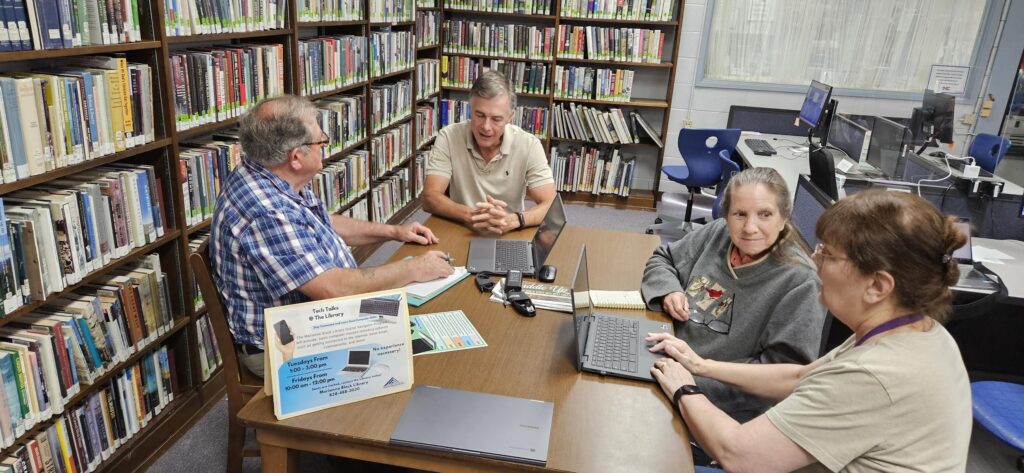
Exciting Projects in Progress:
- Clay County is using its digital inclusion funding to provide training and devices to several different target populations in their area with whom they’ve noticed a need for training and devices
- This includes older adults, students, and children aging out of the foster system
- Their goal is to distribute 70 devices and provide 10 training sessions with this funding
Next steps include:
- Several organizations in our region have plans to take on DI projects in the coming months, and we’ve found that DI is a topic that reaches across so many different sectors and organizations. Many organizations have submitted applications for the NCDIT Digital Champion grant, and those projects would include everything from public wifi access to a digital navigator to access to devices.
- For example, several counties would like to utilize active community centers to provide more localized digital skills training for communities. This would involve a partnership with either the community college or the library system to provide the training.
- In addition, the rural nature and mountainous terrain of our region means that broadband deployment remains a challenge. Several communities have started or will soon start public wifi projects in remote areas of their counties, ensuring that residents of those areas have a safe, reliable place to access the internet where Fiber-to-the-Home is not available and likely will not be available for some time.
Western Piedmont Digital Inclusion Plans
- Alexander County Digital Inclusion Plan
- Burke County Digital Inclusion Plan
- Caldwell County Digital Inclusion Plan
- Catawba County Digital Inclusion Plan
Fueled by recent successful strategic planning processes, figuring out the next steps to connect residents was a natural next step for Western Piedmont. The guidance and recommendations laid out in the plan lead to no doubt that the region has the vision and partners to support residents with digital inequities that exist.
Important Partners on the Ground:
- Burke County Library
- Privacy pod for secure digital needs
- Smart Lounge and Table
- Purchasing AWE Learning computers for children and families
- Burke County Senior Center
- 20 laptops and 20 tablets purchased for use
Next steps include:
- Working with Burke County partner organizations for a collaborative digital inclusion project
- Categories:
